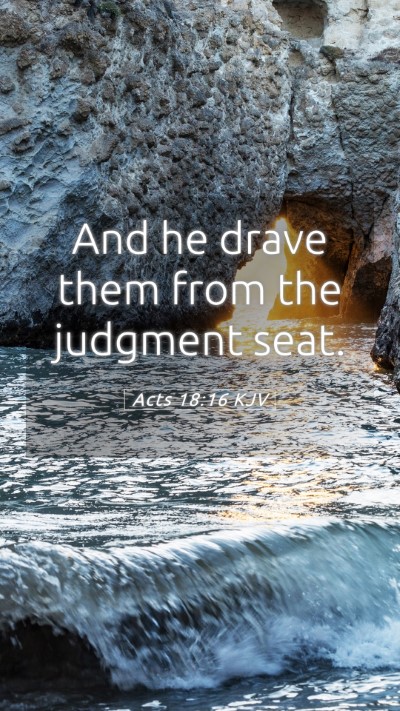Understanding Acts 18:16
In Acts 18:16, we witness a significant moment in Paul’s ministry, where the dynamics of authority, judgment, and the protection of the apostolic mission are emphasized. The verse states:
"And he drove them from the judgment seat." This brief account carries profound implications. In this commentary, we will delve into the meaning of this Bible verse, exploring its interpretations, context, and applicable lessons for believers today.
Contextual Background
To fully grasp the significance of Acts 18:16, it's critical to consider the historical context in which this event occurs. Paul had been in Corinth, preaching the Gospel and establishing a church amid opposition. The Jews, hostile towards his teachings, brought Paul before Gallio, the proconsul, accusing him of promoting an unlawful religion.
Commentary Insights
Matthew Henry's Commentary
Matthew Henry notes that Gallio's actions illustrate a crucial understanding of legal authority versus religious conviction. He emphasizes that Gallio perceived the charges against Paul as trivial, stating that it was beyond the jurisdiction of Roman law to adjudicate religious matters.
Albert Barnes' Commentary
Albert Barnes elaborates on the refusal of Gallio to judge Paul’s case, indicating that this act safeguarded the early church's ability to flourish without state intervention in spiritual matters. Barnes also stresses the broader implication that Christian leaders were to focus on their mission without fear of secular retaliation, thus affirming God’s providential safeguarding of the Gospel.
Adam Clarke's Commentary
Adam Clarke suggests that the rejection of the case by Gallio serves as a demonstration of divine protection over Paul. Clarke points out that the narrative emphasizes the wrongness of the Jewish leaders' accusations, highlighting the futility of opposing God’s work. Clarke also notes that Gallio's dismissal of the case might have emboldened the early Christians in their evangelical efforts in Corinth and beyond.
Key Themes and Lessons
- Authority and Jurisdiction: The confrontation in Acts 18:16 displays the dynamic tension between earthly authority and divine mission, emphasizing that spiritual matters often transcend civil authority.
- Divine Protection: The events depicted underscore the theme of God’s protection over His servants as they fulfill their calling amidst opposition.
- Witness in Adversity: Paul’s perseverance despite challenges illustrates the importance of witnessing in difficult circumstances, showcasing faith and commitment to the message of Christ.
Application for Today
The events surrounding Acts 18:16 challenge modern believers to navigate complex relationships with societal authorities when those authorities come into conflict with spiritual mandates. This passage encourages Christians to trust in God’s overarching sovereignty while remaining faithful to their witness.
Cross References
- Acts 5:29: "We must obey God rather than men." This verse echoes the priority of divine command over human authority.
- Romans 13:1: Paul instructs believers on the importance of submitting to governing authorities, establishing a balance between respect for God and civil law.
- 1 Peter 2:13-14: This passage expands on the theme of civil obedience, highlighting the duty of Christians to honor leaders while upholding their faith.
Conclusion
Acts 18:16 serves as a rich text for Bible study insights into the nature of authority and divine protection. For those seeking Bible verse meanings and interpretations, this verse illustrates the importance of remaining steadfast in faith, even when societal structures attempt to impose restrictions on spiritual beliefs. By engaging with this scripture, readers can learn how to navigate their faith in contemporary society while grounded in biblical truth.


